The first book I was ever given was Tales from the Arabian Nights. I still have it, inscribed: “To Michael, with love from his Daddy, 5th May 1950.” It’s a chunky hardback with an alluring cover, showing a girl reading from an open book to an entranced boy; behind them, one of the Forty Thieves, sword in his mouth, peers menacingly out from the top of a tall jar. Below them stretches a wide blue sea beside whose shore rise the domes and minarets of a mosque. The cover illustration, and the stories within, not only captivated and enthralled me, they defined in my seven-year-old mind what foreignness was. It was my first experience of the allure of other places.
The desire to travel and write stayed in my system for a long time, and yet was not a likely career option for a man making his living selling dead parrots and pretending to be Pontius Pilate.
I must have given off some subliminal signs of wanting to see the world, though, because in 1987 the BBC approached me to not only see it, but travel across it with a camera over my shoulder in what became Around the World in 80 Days. I made seven more journeys for the BBC, and then in 2018, much to the concern of my wife and most of my friends, set off to North Korea with Channel Five and ITN Productions.
In September 2019, I went into Bart’s Hospital in London for open-heart surgery (during which a mitral valve was repaired and an aortic valve replaced), but within a few months I was feeling not only better but bolder too, and looking at my atlas again with a newfound confidence. Before I could rush to the nearest airport, however, the world hit the pause button. Airports emptied and the skies fell silent.
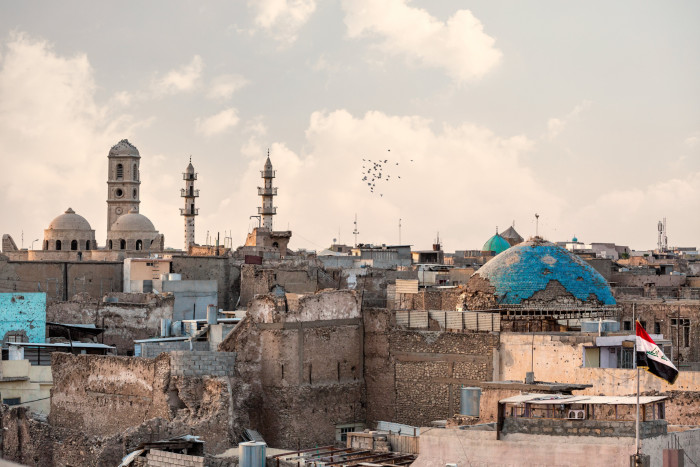
For those of us for whom travel is an addiction, the sound of doors slamming all over the world only increased our curiosity and intensified our determination to be ready when we were able to move again. Syria became a favoured option, if we could do it without endorsing the Assad regime. In the end the decision was taken for us when the Syrian authorities found that I had given money to the White Helmets and promptly cancelled our visas.

As we prepared to roll up the maps and think again, one of Syria’s neighbours caught our eye: Iraq was opening up again after the dreadful conflicts of recent years. It was the home of the world’s earliest civilisations, known by the Ancient Greeks as Mesopotamia — the land between two rivers. It was where much of the Old Testament happened. Abraham and the Prophet Daniel grew up here, the Garden of Eden was said to have been located at the confluence of the Tigris and the Euphrates.
But what really triggered my interest in Iraq was not its ancient and illustrious past but its present and future. I’ve always felt that the real interest of a country lies in its people. The stories they have to tell are often at odds with the view from outside. Just how had today’s Iraqis survived the brutal killing and bloodshed of three previous decades? What was the reality behind all the bad news? There was only one way to find out.
A couple of months short of my 79th birthday, and armed with a doctor’s note, I was reunited with my crew at Heathrow almost four years after we had left for North Korea. I was pleased to feel the same frisson of excitement that always signalled the start of a new journey. I had passed the first test: I wasn’t travel-weary.
We arrived late at our hotel in Istanbul and left in darkness the next morning to catch an internal flight. Which is when I had my first moment of doubt. Standing up to walk to yet another departure gate, I had an attack of giddiness. Things began to swirl around. The centre wouldn’t hold. I steadied myself on the back of a seat and trying to disguise any alarm, asked as nonchalantly as possible for a bottle of water from one of the crew. Focus was quite quickly restored but I felt that this was a warning and it worried me.
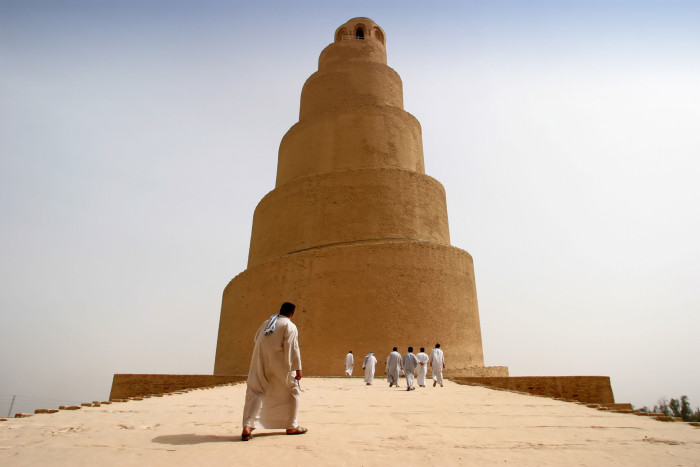
The next day the magic of travel returned as we began our filming in deep snow beside the steel-grey waters of Lake Hazar where the River Tigris rises. Over the next two and a half weeks, we would travel a thousand miles south-east, to where it meets the Arabian Gulf.
The cities and towns of southern Turkey, such as Diyarbakir and Mardin, were an eye-opener, rich in elegant stone mosques, markets and fortifications. But they were the appetisers to the main course and it wasn’t until we joined the endless lines of trucks feeding into the customs barriers at the Iraqi border that I realised, quite sharply, that the easy bit was over. Only 24 hours after leaving the thousand-year old walls of Mardin, we were in Mosul, picking our way through the rubble of equally ancient walls, flattened and shattered in the battle to free the city from the Isis occupation only five years ago.

I was profoundly touched to find children still living in those houses that remained undamaged. They smiled at me, and when I told them my name they replied softly, “You are beautiful” — a refrain I would hear often in Iraq whenever names were exchanged. Their cheerfulness in these shattered surroundings brought me to the edge of tears. But my tears were the last thing they wanted. For them I was a visitor. A happy diversion. Someone to be shown around and offered food and made comfortable. Such was the survival instinct.
On a bright morning, we gathered outside the Rixos hotel in the town of Duhok. “Candle in the Wind” was playing in the lifts as I checked in the previous night, and “Hey Jude” as I rode down to breakfast. Shielded from the road by blast barriers, we were briefed by James Willcox, whose company Untamed Borders specialises in taking people to places most other people don’t want to go. Standing beside him was Peter, ex-army, accompanying us as security and medical escort. No one suggested that he was here because I was so old, but I couldn’t help sensing that he was keeping an eye on me. I, in turn, was determined to pretend I was 28, not 78.
Iraq was created by the British after the first world war and it remains a heterogeneous mismatch of different tribes, cultures, religions and ways of life. One of the most prosperous parts of the country is Iraqi Kurdistan. Close to the northern border, it receives heavy investment from neighbouring Turkey, and as we arrived at night, it seemed every building was strip-lit with neon, like an oriental Las Vegas.
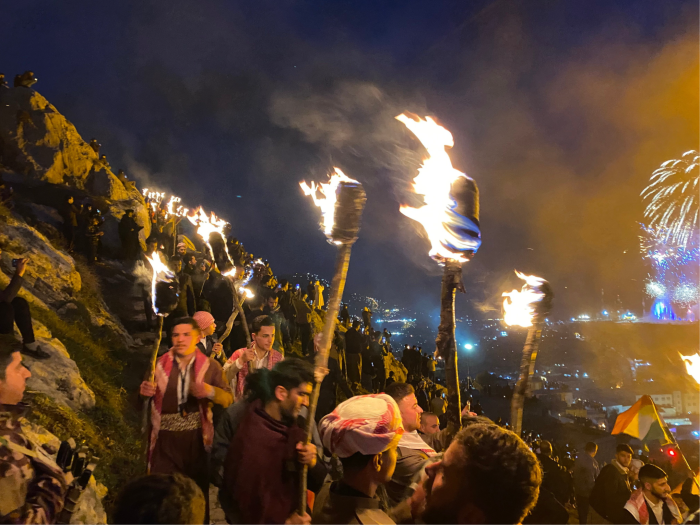
We timed our arrival to coincide with Nowruz, the Kurdish new year celebrations, the focus of which was a small mountain town called Akre. Its narrow, precipitous streets were rammed with cars and people. The sound of fireworks and the snap of firecrackers filled the air. Huge Kurdish flags hung down the mountain and a slowly building hysteria of noise and light crescendoed into the climax of the day, a torch-lit procession curling its way up to the top of the mountain as dusk fell. We were in the thick of it, filming and recording as blazing torches swung wildly and boulders, dislodged by excited processors, tumbled down the slope towards us. It was beautiful and exciting and dangerous — but not the kind of danger I’d anticipated.
As we moved south into federal Iraq, the more predictable threats were evident. Every road we took was dotted with security checkpoints at which bulkily armed guards checked our documentation with studied indifference.

We were warned that Isis militias were still operating in the country, and the price we paid for staying safe was to accept virtual imprisonment in our hotels: no walking outside after dark, no solo sightseeing.
The evidence of recent conflict was everywhere, from the ruins of Saddam Hussein’s palaces to the fading photos beside the Tigris at Tikrit. This improvised shrine marked the spot where, in 2014, 1,700 Shia cadets were murdered and tossed into the river by a Sunni jihadist group who, I’m told, claimed they were avenging the death of Saddam.
The only place outside of Kurdistan where I sensed real hopefulness was Baghdad. Despite a political stalemate with no prime minister confirmed to head the recently elected government, I felt safer on the streets than elsewhere and there was a reassuring cultural life, with poets entertaining an enthusiastic audience with satirical material in a public garden by the river, and Bookseller Street thronged with punters.
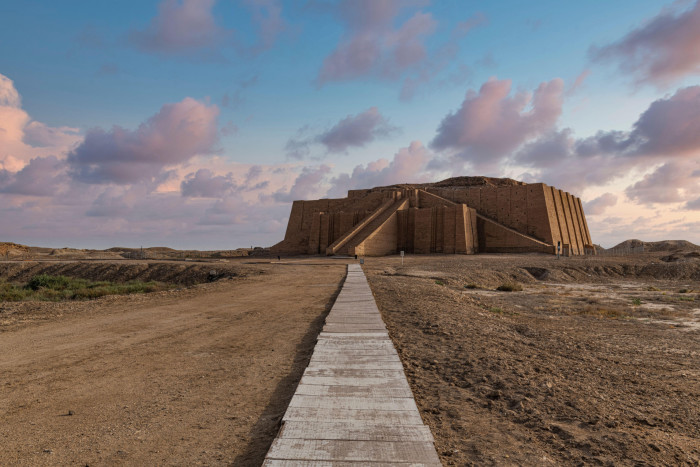
Halfway through the shoot, I faced my toughest physical obstacle as I attempted to climb the beautiful biscuit-coloured minaret at the Great Mosque of Samarra. For more than a thousand years people have been climbing the Malwiya minaret and they still haven’t thought of putting a rail on the outside of the stairs. But I managed the climb and even conquered a fearsome vertigo by standing on the flat stone slab at the very top with nothing to break my fall. The British archaeologist Sir Mortimer Wheeler described it as “a great and rather lonely masterpiece” — it was worth every drop of sweat to look out over the wide meandering Tigris and feel secure enough to try and imagine the world’s first cities built out on that floodplain 10,000 years ago.
Imagination is essential if you really want to enjoy the extraordinary history. Some of the great sites, such as Nebuchadnezzar’s Palace at Babylon and even the astonishingly powerful Ziggurat of Ur have had to be restored. Much of the work was commissioned by Saddam Hussein, but it has been carefully and authentically done.

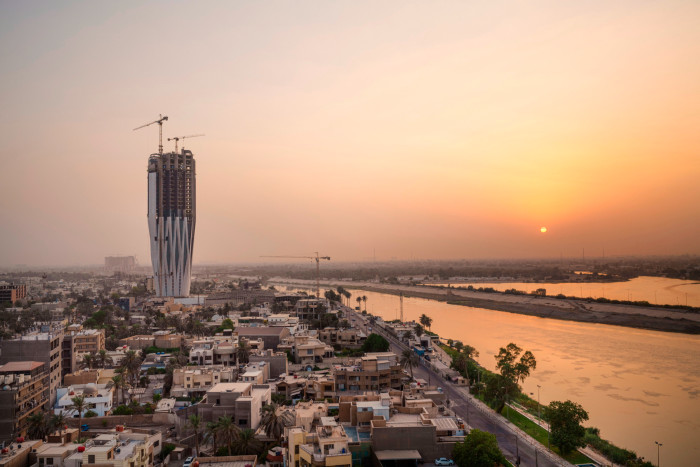
As for more recent constructions, Baghdad Central Station, along with Zaha Hadid’s Central Bank of Iraq Tower, is one of the finest buildings in the capital, but such is the parlous state of Iraq’s railways that only three trains a week run out of it. We took one of them, the night train to Basra, as far as Nasiriyah, Iraq’s fourth-biggest city, about which my guide book could find little to say. Our hotel was perfectly comfortable but when I threw open the curtains in the morning to feast my eyes on the Euphrates, there was a bullet-hole in the window.
The volatile edginess of Iraq, the inability to present itself as a clear, composed united country, made it a sometimes trying but always fascinating destination. Not for a moment did I regret travelling for television again. And, to my great relief, I suffered no repetition of the twinges of giddiness I experienced at Istanbul airport, even at the top of the totally unfenced thousand-year old minaret at Samarra. So I don’t think I need to tell my doctor.
Sir Michael Palin is a former president of the Royal Geographical Society and member of the comedy group Monty Python.
‘Michael Palin: Into Iraq’ airs on Channel 5 in the UK from September 20. His book of the same name is published by Hutchinson Heinemann. Tickets for Michael’s tour ‘From North Korea into Iraq’ are available at TheMichaelPalin.com
Details
The UK Foreign Office and US State Department currently advise against all travel to Iraq. For those still keen to visit, specialist operator Untamed Borders (untamedborders.com) offers a range of group and private trips, from cultural tours of southern Iraq to skiing in the Choman region
Find out about our latest stories first — follow @ftweekend on Twitter
Stay connected with us on social media platform for instant update click here to join our Twitter, & Facebook
We are now on Telegram. Click here to join our channel (@TechiUpdate) and stay updated with the latest Technology headlines.
For all the latest Travel News Click Here
